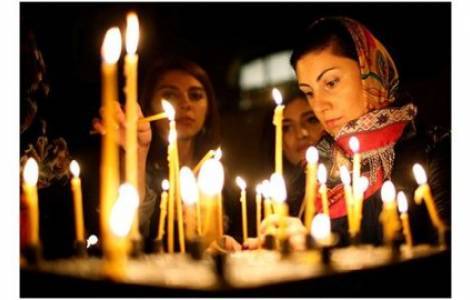
by Gianni Valente
Rome (Agenzia Fides) - There is a People of God gathered and beloved by Jesus, who continue to ask for his presence and his consolation in the tribulations of life, entrusting their expectations to the words of simple prayers. It is the grateful recognition of the vitality of this people that led Pope Francis to make a short trip to France just before Christmas, to take part in the closing session of the Congress on Popular Religiosity in the Mediterranean (“La Religiosité Populaire en Méditerranée”) on Sunday 15 December in Ajaccio, in Corsica. The reference to popular spirituality runs like a thread through the entire magisterium of Pope Francis. A subtle reference that is not repeated out of a desire for justification, not to "rehabilitate" practices and gestures that are denigrated by certain "developed" circles as naive forms of expression to be discouraged or, at best, tolerated. Even before becoming Bishop of Rome, Pope Francis always stressed the missionary value of the simplest acts of devotion of the People of God. During his years of priestly and episcopal ministry, he was able to experience that they "contain an active evangelizing force which we must not underestimate, otherwise we would fail to recognize the action of the Holy Spirit" (Apostolic Exhortation Evangelii Gaudium, § 126).
Pope Francis constantly recalls the spirituality of the people, not only as an expression of the dynamic of "inculturation" by which each people expresses the faith in Christ received as a gift in the forms most familiar to its own culture. For Pope Francis, the trait that characterizes the spirituality of the people at its source is precisely its "theological" aspect, its connection with the action of the Holy Spirit himself, who "leads the People of God to the truth and leads them to salvation". The action of the Holy Spirit - the Bishop of Rome reiterates, referring to the Tradition of the Church - equips the people of the faithful with an "instinct" of faith - the "sensus fidei" - which helps them to recognize and follow the action of the grace of Christ. And the "sensus fidei" of the People of God, a gift of the Spirit and a sign of his love - as Pope Francis emphasizes - is manifested with unique power precisely in what is also defined in his "programmatic" Apostolic Exhortation "Evangelii Gaudium" as "spirituality" or "popular piety".
The totality of gestures and practices with which "it can be said that the people are continually evangelizing themselves" and which are to be recognized as "authentic expressions of the spontaneous missionary action of the People of God" (EG §122).
In his first Apostolic Exhortation, Pope Francis uses quotes from the final document of the Fifth Assembly of CELAM in Aparecida in July 2007 to recall the riches "that the Holy Spirit unfolds in popular piety with his gratuitous initiative" (EG §124). Popular piety, the "spirituality embodied in the culture of the simple", brings with it "the grace of the missionary spirit, of going out of oneself and of being a pilgrim: "Going together to places of pilgrimage and participating in other expressions of popular piety, taking children along or inviting others, is in itself an act of evangelization" (EG §124).
The Bishop of Rome has repeatedly distanced himself from the attitude of those who dismiss the gestures of popular piety as mere manifestations of natural religiosity: "Those who love the holy faithful people of God," writes Pope Francis in his Apostolic Exhortation Evanglii Gaudium, "cannot see these actions as solely a natural search for the divine. They are the expression of a life pleasing to God, animated by the action of the Holy Spirit who is infused in our hearts" (EG §125). In the prologue to Enrique Ciro Bianchi's book on the theology of the people, Pope Francis affirms that "popular spirituality is not the Cinderella of the house. It is not those who do not understand, who do not know... We are always haunted by the specter of enlightenment, which leads us to ignore concrete reality. And God wanted to speak to us through concrete realities. The first heresy of the Church is Gnosticism, which the Apostle John criticized and condemned. Even today, there can be Gnostic positions in the face of this fact of spirituality or popular piety.” Even the late Argentine priest Rafael Tello, father of the "Theology of the People" together with Father Lucio Gera, gave thanks for that custom of gestures and practices with which the people evangelize themselves "better than even priests are used to doing", and of which the concern to baptize children is "the most important manifestation".
In recent weeks, French intellectuals and commentators have spoken out in relation to the news of the papal trip to Ajaccio. For example, Camille Dalmas writes on “Aleteia. Org” about the “rebirth” of the Confraternities in Corsica; the essayist Jean Duchesne recalls in this the context of the dynamics of popular spirituality as an "antidote" to clericalism and the newly emerging elitist intellectualism, Professor Yann Raison du Kleuziou, interviewed by Marie-Lucile Kubacki for the weekly newspaper "La Vie", took up the intuitions of the Dominican and sociologist Serge Bonnet and the priest Robert Pannet, who had already documented in the mid-1970s how popular piety had become the target of the then leading elite circles.
Those who practiced "insidious clericalism in the name of the modernization of Catholicism" fueled feelings of guilt among the working class while claiming to "speak in the name of 'the people'". (Agenzia Fides, 14/12/2024)